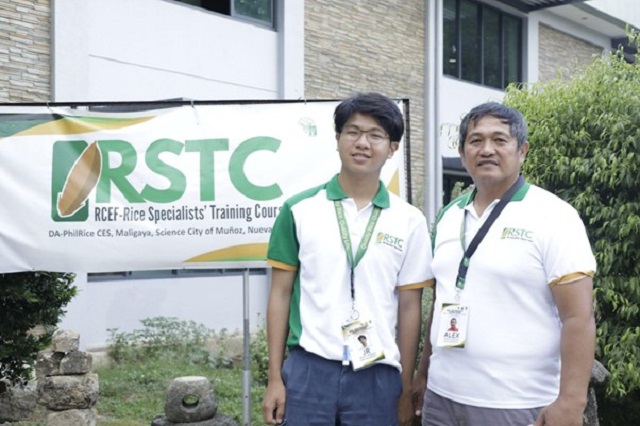
For Alex Equias, a training graduate under the Rice Competitiveness Enhancement Fund (RCEF) Program, farming is a family affair.
His view is shared globally as the Food and Agriculture Organization of the United Nations declared 2019-2028 as the UN Decade of Farming. The UN published that more than 80% of the food in the world is produced by family farmers.
“I want farming to be something my family continues to do for generations to come. It would be better if I can inspire other families to do the same,” Alex, who trained with his 18-year-old son as a rice specialist, said.
Alex, who was raised by farmer parents, first attended the modified 10-day training course facilitated by the Agricultural Training Institute (ATI) back in 2019.
It was during that training that inspired him to open up a farm school.
He opened Equias Integrated Farm two months after and they’ve already trained more than 300 farmer-students since 2019.
To further improve their ability to teach farmers, Alex and his son of the same name became rice specialists.
They trained for five months in the RCEF’s Rice Specialists Training Course facilitated by the Department of Agriculture-Philippine Rice Research Institute (DA-PhilRice) from October 2021 to April 2022.
They learned through a mix of online and hands-on lessons that discussed agro-ecosystem analysis and pest and nutrient management. The training course also capacitated them to operate rice machines in rice planting.
“Learning is more enjoyable with family. It becomes another type of bonding that toughens our relationship as parent-child,” said the 52-year-old Alex Sr.
The leadership training they received as a part of the rice specialist training also prepared them for handling classes with farmers.
Alex believed he couldn’t have done it without the steady support of his family, especially his son who he has a strong bond with.
He likened his relationship with his son, to his own relationship with his mother who taught him everything he learned about livestock and agriculture.
He learned to plant high-value crops that their family could not only sell but also consume, so they’d be able to make ends meet.
“My mother taught me how to manage money properly, to save for our future,” he recalled, “We suffered, but we were determined to improve our state of living and that’s also the lesson I’m trying to make my family appreciate, I want to teach those values through agriculture.”
This inspired the younger Alex to choose a path that would lead him to agriculture.
His frequent trips to their 7-ha farm cultivated with rice and high-value crops encouraged him to study agricultural and biosystems engineering with the goal of working in the agricultural sector someday.
In the farm, the young Alex leads in planting vegetables like tomato, lettuce, and okra. During the harvest season, he operates their machines to harvest rice and while he is one of the trainees in the farmer field school.
According to Alex, Sr., it was a struggle to increase their yield before because of the lack of smart practices that could also help them save their money during production.
Applying what they learned from their training, they doubled their 3t/ha harvest to 6.2t/ha of rice last season. From the RCEF training, they now follow the recommended pest and nutrient management–they stopped spraying pesticides and guessing the amount of fertilizer they would put in their lands.
“We’re now more intentional and precise with our farm inputs and we were smarter in our decisions on the farm,” he added, “We worked smarter, too.”
Their biggest innovation was to use the combination of organic and inorganic fertilizer which helped reduce up to 50% of fertilizer applications. They can also produce their own fertilizer and pesticide for our own use.
They have shared these practices with their farmer-students to hopefully reduce their costs in rice production, too.
This year, they plan to continue conducting Farmer Field Schools (FFS) as new farming technologies also emerge. They’re also offering short courses for pest and nutrient management to busy farmers who still want to learn more about rice farming.
“We’re staying the course, helping ourselves and the farmers in our country,” the father and son said.
RCEF was created through Republic Act 11203 or Rice Tariffication Law (RTL), which aims to improve the competitiveness of rice farmers and increase their income through the provision of seed, mechanization, extension, and credit services. The DA-PhilRice, DA-PHilMech, ATI, TESDA, Land Bank, and the Development Bank of the Philippines implement the program’s components.




